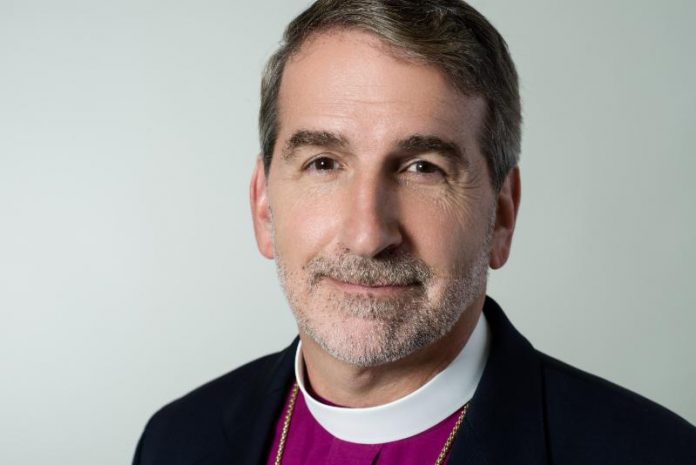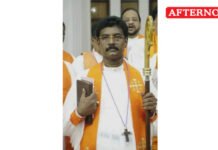Anglicans have had a rough year, according to Archbishop Foley Beach in in a somber but hopeful address before the Anglican Church in North America (ACNA) Provincial Council, meeting June 23-24 in an online web conference.
Beach cited tired clergy facing “decision fatigue” amidst the COVID-19 pandemic, violence and racial injustice, and the departure of two dioceses last year leading to the denomination’s first significant drop in numbers.
There was also positive news: favorable decisions were handed down for the Dioceses of Fort Worth and South Carolina in long-running legal conflicts with the Episcopal Church from which they had disaffiliated.
“God has been using our churches in big ways not only with online ministries, but caring for the needy and those in hard times,” Beach noted.
“A Sin Problem”
Much of Beach’s address focused upon racial strife.
“The past few months have not only been pandemic, but pandemonium,” the Anglican archbishop summarized, referencing “evil displayed by fellow image bearers and some police officers in recent weeks.”
Beach referenced hearing louder “cries of grief in our own neighborhoods” and peaceful protests “hijacked by chaos and violence” destroying property, injuring both bystanders and more than 800 police officers.
Bishop John Guernsey, Dean of Provincial Affairs, has been tasked by the College of Bishops to put together a Working Group on Race, Racism, and Racial Reconciliation “to help us talk as Biblical Christians in the midst of a polarized culture.”
“We have failed to fully and thoroughly and deeply address the problem of sin in our hearts, homes, churches, and nations,” Beach diagnosed. Racism, “in its root, it is a sin problem. We need God to rend our hearts as a Church.”
The Archbishop said the Church must acknowledge “systemic sins” but also distance from “those movements that are promoting anarchy, destruction of the family, and the dismantling of our government.”
“It will not be through political parties, rallies, slogans or marches that our attitudes and practices are changed, that the souls of our nations are converted,” Beach stated.
The “revival that comes from repentance” starts “in your own relationship with God,” and then in “building a relationship with someone different than you are,” he said
Anglican Decline?
The ACNA saw decline across three objective measures in 2019: membership, attendance, and number of churches. Most of the decline, which staff said “should not necessarily raise alarm,” is attributed to the withdrawal of two dioceses in the Convocation of Anglicans in North America: West and Trinity.
Three CANA dioceses operated within both ACNA and the Church of Nigeria. In 2019, an agreement prompted these dioceses to continue with a single province. CANA East continued as part of ACNA and changed its name to Diocese of the Living Word. CANA West and Trinity (largely composed of expatriate Nigerians) opted to continue as part of the Church of Nigeria. The dioceses remain relationally connected to ACNA through the Global Anglican Future Conference (GAFCON) but their bishops are no longer seated in the ACNA College of Bishops and their clergy are no longer canonically resident in ACNA.
Archbishop Beach did not sugarcoat the loss to the Council: “We felt the sting of division. We have watched some broken relationships go unhealed.”
The number of ACNA congregations decreased by a net of 94, from 1,066 to 972. Membership decreased from 133,279 in 2018 to 127,624 in 2019, attendance declined from 87,319 to 84,310.
Adjusting for the two CANA departures, the Province, while still declining in number of congregations (-20), grew slightly in membership (+202) and attendance (+559).
The reported numbers represent the first significant decline in the denomination, which emphasized church plants and adding first-time Anglicans, since it was formed in 2009.
Dioceses reporting significant attendance gains in 2019 included Churches for the Sake of Others (+419), South Carolina (+670), Rocky Mountains (+591) and the Anglican Network in Canada (+319). Declines were reported in the Dioceses of Christ Our Hope (-384), Quincy (-245), Western Gulf Coast (-246), and Fort Worth (-267). A complete chart can be viewed below. (Note that some declines and gains may be partly attributed to transfer of congregations between dioceses.)
Provincial Council includes an elected four-person delegation from each ACNA diocese: bishop, clergy, and two lay delegates. It convenes annually and oversees governance between gatherings of Provincial Assembly, a larger body with representation based on diocesan size.
The Council elected to the denomination’s Executive Committee Albert Thompson of the Diocese of the Mid-Atlantic and Deborah Tepley of the Anglican Diocese of Christ Our Hope in the lay order and Herb Bailey from the Diocese of Pittsburgh and Chris Culpepper of the Diocese of Fort Worth in the clergy order. They will serve three-year terms.
Watch Archbishop Beach’s address to Provincial Council, delivered via a Zoom web conference, below:





Thanks for posting the spreadsheet. It cuts through much of the hype.
I believe Abp. Beach is the real deal. The poor guy is most likely being pulled in many different directions at the same time and getting too much advice in the wrong direction. His statement on racism is a reaction to someone else’s agenda that was probably best unsaid during the present hysteria. Don’t feed the monster. People playing word association might start with anglican, Anglo-Saxon, WASP, and end by saying choose another name now.
No response will be adequate.
“It cuts through much of the hype.”
It certainly does. That part of ACNA which didn’t go to the Church of Nigeria grew. Its slow growth, but nevertheless growth.
My spouse is an economist and mathematician, read this, and said that the bottom line is not altered by the ‘adjusted’ version; you don’t really adjust for significant losses when talking about the bottom line. It remains to be seen if the denomination will continue to experience an annual decline as it has for 2018 and 2019. The bottom line is that the ACNA has declined from its higher 2017 number of 93,489 to 84,310 in 2019.
Except that this decline happened only because two dioceses who were dual members of the ACNA and the Church of Nigeria left to become solely members of the Church of Nigeria. I think if it wasn`t for that departure ACNA membership would have increased in fact.
Departure is a leading cause of decline, yes. I believe that goes without saying. If TEC had not lost the former members who formed the ACNA and if the Lutheran Church Missouri Synod had not lost members, then TEC and Lutheran Church Missouri Synod would not have declined either.
“Departure is a leading cause of decline, yes. I believe that goes without saying.”
No, it doesn’t go without saying. There is a world of difference between (i) numbers getting lower because a group decides to split (amicably, I might add) and (ii) numbers getting lower across the denomination because more parishioners are leaving or dying off than are being added.
“then TEC and Lutheran Church Missouri Synod would not have declined either.”
Sorry, but that’s not true. Most TEC dioceses have been declining in numbers for years, and TEC as a whole was and is declining overall. That is distinct from a loss of numbers due to dioceses leaving.
Let’s also not forget what the facts are: Four dioceses left TEC in 2009 – that is old news. The fifth diocese (SC) left TEC in 2017. Those numbers are easily seen and allowed for. It doesn’t change the fact that TEC is in general decline quite apart from the dioceses leaving.
Again, if nobody left the TEC, Dioceses and individuals, then it would only be receiving new members. If nobody left the also declining SBC or LCMS, then they would only be receiving new members.
Arguing that they are somehow growing, while declining, is rooted in logical fallacy. This is not an ideological argument or debate. This is a factual numerical examination of the situation of denominations. TEC declined, despite receiving new individual members, when Dioceses and congregations left. The ACNA declined when they lost their two dioceses. These are facts. We can spin it however we want, but what is the ‘bottom line?’ Does the ACNA have more or less members? Less.
Your argument is rooted in logical fallacy. You are trying to deny that ACNA is achieving growth, and trying to gloss over the fact that TEC is in significant and long-term decline.
“TEC declined, despite receiving new individual members, when Dioceses and congregations left.”
No, TEC was in decline before any dioceses left, and during, and after. Four dioceses left in 2009, and one left in 2017. Regardless of that, TEC was and is in decline. Every year it grows smaller because the parts of TEC that remain are in overall decline.
The parts of ACNA that amicably left to form a separate denomination, and the parts of ACNA that stayed, are both achieving growth. The separation is hardly surprising – from its very beginning, it was made clear that such sepration is permissible and was to some extent anticipated.
You can spin it however you like, but the bottom line is that ACNA is doing the right thing – what it is doing is working. The same applies to the Nigerians who have gone their own way. Whereas what the denomination which they both left (TEC) is doing is not working.
What this shows is that denominations are declining across the board. I believe this is unfortunate as a Christian, but I think it also presents opportunities to reevaluate how we evangelize. Mainline Protestant denominations, evangelical denominations, Orthodox churches, and even the Catholic Church have declined over the last 20 plus years. TEC and the ACNA have declined. ELCa and LCMS have declined. ABCUSA and SBC have declined. It’s pretty across the board.
Sorry, but that’s just obfuscation. ACNA hasn’t declined – part of it formally separated to form a new grouping, but those parts that remained in ACNA have grown, as did those who amicably left.
When people say that TEC is in decline, that’s not because a diocese left three years ago, nor because four dioceses left 10 years ago. Its because each year TEC gets smaller overall. Far less people join TEC than either die or leave.
As for denominations in general, Anglicanism across the world is growing. Its a mistake to focus just on western provinces like England or USA when that is not where most Anglicans are.
Sorry, but that’s just obfuscation. ACNA hasn’t declined – part of it formally separated to form a new grouping, but those parts that remained in ACNA have grown, as did those who amicably left.
When people say that TEC is in decline, that’s not because a diocese left three years ago, nor because four dioceses left 10 years ago. Its because each year TEC gets smaller overall. Far less people join TEC than either die or leave.
As for denominations in general, Anglicanism across the world is growing. Its a mistake to focus just on western provinces like England or USA when that is not where most Anglicans are.
The numbers are what they are. Now we know. Starting from this base grow the denomination. There was a last minute throw away resolution at TEC’s 2000 General Convention called 20/20 to double membership in 20 years. It could have been achieved. Instead the direction was to run folks off making way for the ‘new thang’. ACNA should take heed.
The key difference however is that TEC is dying off – it is not making enough new disciples to outweigh the numbers who just drift away or die.
ACNA is the opposite – its dioceses appear to be growing.
Its easy to quantify the numbers when a diocese departs from a denomination. Decline or growth otherwise happens for different reasons.